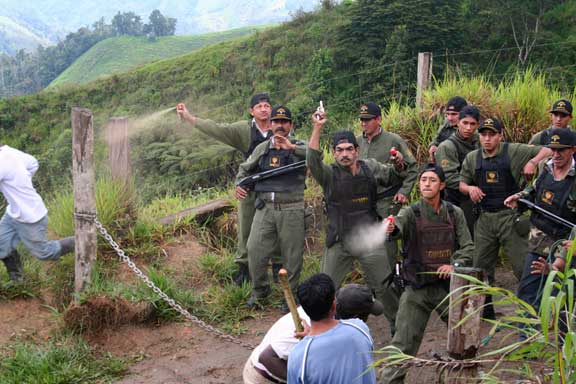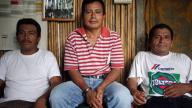(Updated on February 11th, 2012)
Over the past couple of years, Private Member’s Bill C-300 had MiningWatch focused on efforts to bring about legislative change through the Canadian parliament in order to hold our extractive industry to greater account for its operations abroad. But while our attention has been on Parliament Hill, Canadian courts have become another important front in the battle against corporate impunity.
Until recently, few have ever tried to sue Canadian corporations in Canadian courts for environmental disasters and human rights violations occurring abroad. Two previous lawsuits were thrown out of Quebec courts over jurisdiction, in which the court decided that the cases would be better heard in the country where abuses took place.[1]
This was the case for a 1997 class action lawsuit filed against Cambior for a tailings dam break at the Omai mine in Guyana, which dumped a cyanide-laced cocktail of mine waste into the Essequibo River. When the suit was then filed in Guyana, it was dismissed and the plaintiffs ordered to pay the company’s legal costs. Similarly, a lawsuit filed in Quebec against two Quebec-registered companies, Green Mount International and Green Park International, for settlement infrastructure built on occupied lands in the West Bank and marketed to Israelis, was dismissed in 2009 with the argument that Quebec was not the appropriate forum.
Such precedents have motivated many, including now retired Supreme Court Justice Ian Binnie, to urge Canada to draw up new legislation that would provide a forum for foreign citizens and companies to have allegations of serious harms heard here. While such legislative change remains elusive, however, five more cases have been brought before Canadian courts. They are both a source of hope and further frustration in the search for access to justice for communities affected by Canadian mining companies operating around the world.
Toronto-based Klippenstein’s law firm is perhaps best known for its representation of the estate and family of Dudley George, who was killed by police at Ipperwash, and more recently for a $45 million class-action lawsuit against the Toronto Police Services Board and the Attorney-General of Canada on behalf of those held by police during the G20 summit last summer. This public interest law firm has also filed four cases on behalf of plaintiffs in Ecuador and Guatemala for abuses at the hands of private security guards hired by Canadian-financed mining companies.
In the first case filed in March 2009, three Ecuadorian villagers sued Copper Mesa Mining Corporation, two company directors, and the Toronto Stock Exchange for damages following an armed assault in which private security guards, mostly ex-military, tried to violently force their way past men, women and children blocking the way to the company’s mineral concessions with a single chain link fence. The plaintiffs alleged that the corporate directors had been given specific information about the attack and had sufficient warning about the risk of further violence so that they should have taken decisive steps to avoid it.[2]
Suing Copper Mesa directly was not possible for jurisdiction reasons. Copper Mesa, like many corporations, split its corporate structure over several legal jurisdictions – the company was incorporated in British Columbia, headquartered in Colorado, had directors all over North America, raised its money in Ontario, had a holding company in Barbados (presumably for tax avoidance), and had its mineral exploration operations in Ecuador. This corporate structure made it very difficult to hold the company responsible in any one of these jurisdictions.
For this reason, the Copper Mesa lawsuit pursued a legal principle that had not yet been tried in an international context – instead of suing the company directly, the Plaintiffs attempted to hold responsible key actors in Ontario whose actions and decisions enabled and caused the harm in Ecuador. The Toronto Stock Exchange (TSX), for instance, had been warned about the risk of violence prior to providing Copper Mesa with access to millions of dollars through a public share offering, yet the TSX provided the company with access to that money anyway, some of which was spent on the security personnel who assaulted the plaintiffs. Similarly, the directors of Copper Mesa were shown photographic evidence of their security personnel assaulting community members and yet failed to take appropriate steps to stop it from happening again.
The courts ultimately rejected this approach, ruling that neither the TSX nor the directors of Copper Mesa had a legal duty to consider possible harms to the plaintiffs when conducting their business. On March 11th, 2011, the Ontario Court of Appeal affirmed a lower court decision which had dismissed the claim.
Lawyer Murray Klippenstein said at the time, “You would think at the very least when directors of a Canadian corporation have been warned and given evidence that personnel are assaulting people, they would have to do something to stop further violence. The Court said that under Canadian law, directors don’t have to do anything whatsoever… One wonders whether Canadian courts in the long run want to adopt rules that have the effect of sticking a Canadian flag on human rights abuses in developing countries.”
On the upside, during the short life of the lawsuit, Copper Mesa was delisted from the Toronto Stock Exchange and lost its holdings in Ecuador.
Despite the loss in court, Klippenstein doesn’t consider the case a failure. As we sit down in his Toronto boardroom to chat he draws two points on the white board and extends a straight arrow between them. He jokes with irony that he had thought the route to justice would be simple. He erases it and redraws a winding arrow that bends and turns back on itself on the way to its goal.
Reflecting on the Ecuadorian case he remarks that the court did take the case very seriously. He refers to the Court of Appeal’s statement in which it said: “the threats and assaults alleged by the plaintiffs are serious wrongs. Nothing in these reasons should be taken as undermining the plaintiffs’ rights to seek appropriate redress for those wrongs.” The final ruling, however, he believes “seems a little out of step, both legally and morally,” given that in both Canadian and British legal systems “it’s come to be accepted by the courts that a person or commercial company has a duty to be somewhat careful to not harm the people around them.” In other words, while jurisdiction was not raised as an issue, he believes that “the real world judges were very aware of the thousands of kilometres between the directors and where the events took place, and they may not yet figured out how to deal with that. But this logic doesn’t fit with a globalized world where the decisions being made in boardrooms in Toronto have significant impacts on the lives of people living halfway across the globe.”
The Ecuadorians have decided not to appeal the case any further, which would have required leave from the Canadian Supreme Court, but Klippenstein is optimistic that through further lawsuits individuals harmed by Canadian mining companies can wedge open space in the justice system to address the wrongs done do them abroad. “We certainly think,” he says, “with more knowledge of other situations and more cases before the courts there may be room for development.”
Klippenstein’s is currently representing Guatemalan clients in lawsuits against HudBay Minerals in response to violence in connection with the company’s Fénix nickel mine project in eastern Guatemala. In the first case, HudBay and its subsidiaries are accused of negligence for the brutal murder of Adolfo Ich Chamán, a community leader and outspoken critic against the company’s operations, who was allegedly shot at close range and killed by the company’s head security guard in September 2009. The second case alleges that the company and one of its subsidiaries should be held negligent for the alleged gang rape of 11 indigenous Q’eqchi Mayan women during a forcible eviction from their community in January 2007.[3] Recently, a third lawsuit has been brought against HudBay Minerals for negligence, for the shooting of a young father, German Chub Choc, by the company's head security guard also in September 2009. German survived the attack, but was paralyzed and lost the use of his right lung.
In order to demonstrate the a legal “duty of care” to the Guatemalan plaintiffs on the part of HudBay Minerals, both statements of claim carefully detail the overlaps between the company’s Toronto offices and the operations in Guatemala to establish the connection between the company in Canada and events taking place in Guatemala. They further attempt to demonstrate that the company had forewarning of potential violence, in particular relying on evidence that human rights observers gathered and made public. Furthermore, they cite the company’s stated commitment to corporate social responsibility, albeit voluntary, that was made publicly and in direct relationship to its Guatemalan operations at the time that events were taking place as a consideration of the company’s duty to others that it itself has acknowledged.
They anticipate that these new cases will also spotlight legal jurisdictional issues, providing an opportunity to explore the relationship between parent and subsidiary companies. While independence between parent corporations and subsidiaries is often assumed, “in an international world, that’s ludicrous,” says Klippenstein.
Concurrently, and as discussed in our last newsletter, a lawsuit against Anvil Mining Limited in relation to a massacre in the Democratic Republic of the Congo has been admitted to the Quebec Supreme Court. In contrast with the cases being brought in Ontario, this lawsuit pertains to events previously brought to trial in the Congo.
The Canadian Association Against Impunity (CAAI), which includes Congolese survivors and organizations such as the Canadian Centre for International Justice and UK-based Global Witness, filed a class-action lawsuit in the Quebec Supreme Court against Anvil on November 8th 2010. CAAI alleges that the Toronto- and Australia-listed public company provided material support to a military attack in 2004 against a group of rebels in the town of Kilwa, an important port for Anvil’s operations.
As a result of these events, during a 2006 military trial in the DRC, nine Congolese soldiers were indicted for war crimes and three expatriate former Anvil employees for complicity in war crimes. In 2007, however, they were all acquitted.[4] On April 28th, 2011, the Superior Court of Quebec accepted this case, rejecting Anvil’s argument that it would best be heard in the Congo or Australia. The judge argued that “if the court were to refuse to accept the application [for a class action]… there would be no other possibility for the victims’ civil claim to be heard.”[5] The CAAI welcomed this decision as a glimmer of hope to the victims of the massacre in Congo and their families.
Unforunately, in late January 2012, the Quebec Appeal Tribunal overturned the Quebec Superior Court's decision. While the Appeal Tribunal recognized the difficulties that the plaintiffs have faced in their search for justice, the court determined existing laws are insufficient for the case to proceed in Quebec courts. The plaintiffs have indicated that they will bring their case to the Supreme Court of Canada to analyze whether the Quebec tribunal's analysis is unnecessarily limited and to determine whether available evidence for the lack of access to justice in other countries was ignored.
All of these cases represent important steps toward Canadian courts awakening to the state of impunity in which our corporations operate around the world, and the urgent need for a real forum here at home to serve justice for those affected.
Notes:
1. The Lawyers Weekly, “Corporate responsibility abroad: Will corporations accused of overseas human rights violations be taken to court in Canada?” Spring 2009
2. www.ramirezversuscoppermesa.com
4. Canadian Centre for International Justice, “Congolese victims file class action against Canadian mining company”. November 8, 2010
5. Global Witness, “Court ruling marks significant step forward in holding Canadian mining company to account”, April 28, 2011

